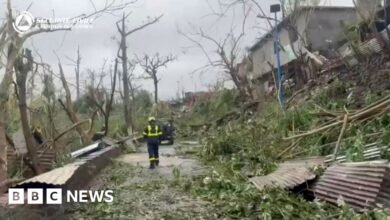Georgia school shooting: Parental responsibility faces tough new test

Across the US, there are laws on the books to punish parents or guardians for everything from academic truancy and underage driving to shoplifting and vandalism.
But prosecutors in the state of Michigan expanded the reach of such statutes earlier this year when they secured dual convictions against the parents of another teen gunman.
James and Jennifer Crumbley were found guilty of involuntary manslaughter and sentenced to at least 10 years in prison for how their criminal negligence as parents contributed to their son Ethan, 14, killing four of his classmates in 2018.
Thursday’s decision to charge the father with murder – a far more severe charge – could again test the legal bounds of parental responsibility.
Eve Brank, a psychology professor at the University of Nebraska-Lincoln, researches how the law intervenes and sometimes interferes with family decision-making.
In her view, the emerging concept of punishing parents after school shootings reflects broader frustration around US gun violence and, in the absence of regulatory reform, the inability to curb the country’s unrelenting series of firearm incidents.
“It’s not like we’ve created a bunch of new laws to address these issues. They’re just being used, somewhat creatively, to address the issue,” she said.
“In terms of what the research shows, most people would agree there are a lot of influences on how children behave, not just their parents.”
But she noted that prosecutors in Georgia may be privy to information from the investigation not yet publicly available and may believe they can successfully argue that, like the Crumbleys before him, Colin Gray’s actions were particularly egregious.
Tim Carey, a law and policy adviser at the Johns Hopkins Center for Gun Violence Solutions, argues that charging parents is also a reflection on weak gun safety policies.
Georgia has been “very apprehensive to gun violence prevention policies”, he said, and prosecutors in such states may “feel confined to trying to bring a sense of justice or retribution after the fact, in part because they couldn’t prevent” such a tragedy.
Source link



